Unethical studies, misinformation in the media, funding and political prejudices, and weaknesses in the peer review system have resulted in the growing mistrust in research. This loss of trust has created skepticism of medical research, scientific discoveries, and research institutions. To restore trust in science, remedies like transparency in publications, open sharing of data, more accountability, and educating the population on critical thinking should be adopted to restore credibility.
Introduction: The Reality of Growing Mistrust in Research
Get into any coffee shop nowadays and talk of some recent health research, and you will most probably be met with eye-rolls to sheer dismissal. Every week, scientists change their minds, people say, or Who paid to study that? Such innocent cynicism indicates a greater issue that goes well beyond the small talk.
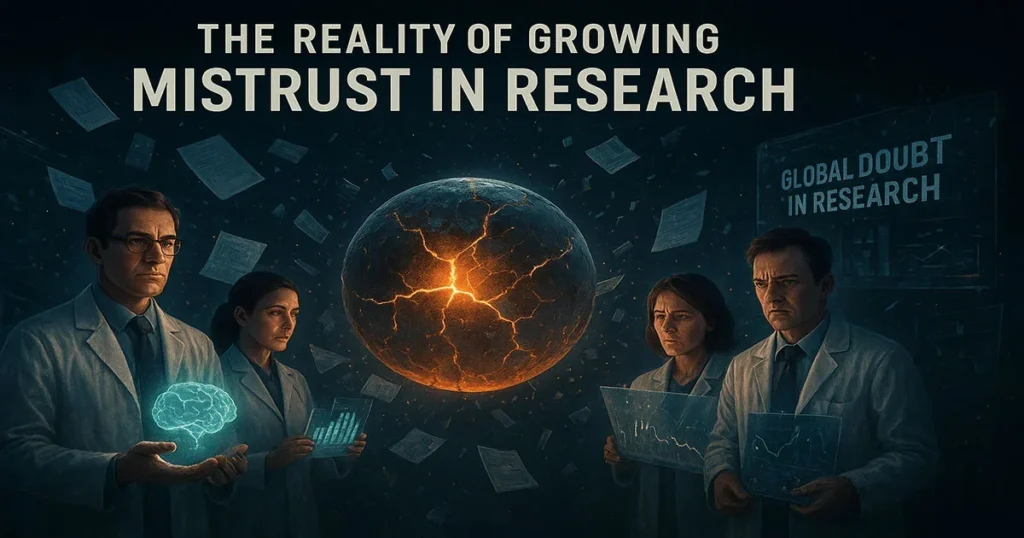
We are witnessing a paradigm change in the way society looks at scientific authority. Scholarship that used to influence opinion and policy is now struggling against conspiracy theories, business cynicism, and political polarization. The consequences touch all the aspects of our lives, including the drugs we believe in and the ecological policies we believe in.
This storm of doubt has been brought about by several interdependent forces. Corporate interests have influenced study outcomes in ways that serve profit over truth. Media houses have focused more on sensational news than on fact coverage. Scientific uncertainty has been used as a tool by political movements to push ideological agendas. In the meantime, the algorithm of social media gives more weight to the most controversial statements and hides subdued, factual information.
The tragedy is not only a lost trust, but a lost opportunity. The loss of lives of children to preventable illnesses occurs when individuals decline vaccines due to fake studies. When societies reject climate science because of fabricated confusion, the process of protecting the environment does not succeed. We see poor health outcomes when patients eschew proven treatment in favor of unproven ones.
But this crisis is also given a chance of renewal. When we know what went wrong and when we put in place meaningful reforms, we will be able to create a more trustworthy, transparent, and effective research ecosystem that actually benefits the needs of humanity.
The Historical Evolution of Trust in Research
Scientific authority did not always have to be challenged with such vigour. Most of the 20th century, before the time Jacobson and Campbell (2007) discuss in their article, involved the discovery of a breakthrough by researchers such as Jonas Salk, who invented the polio vaccine, or James Watson and Francis Crick, who found the structure of DNA, which was celebrated without much questioning.
This age of scientific optimism started to break as various shocking reports were exposed concerning unethical research methods. The Tuskegee experiment, where the researchers failed to treat African American test subjects with syphilis in a 40-year study, revealed how vulnerable people could be misused by the researchers to learn new things.
The cold fusion debacle of the late 1980s demonstrated that some of the brightest of scientists can make dramatic statements that turn out to be unprovable. The scientific community and the media initially accepted the findings when researchers claimed to have performed nuclear fusion at room temperature, before later experiments showed the inability to reproduce their findings.
The biggest blow to the research was when Andrew Wakefield fabricated bogus research that autism was caused by vaccinations. This fake research, although thoroughly condemned and withdrawn, spawned an international anti-vaccination movement that continues to the present and is threatening the health of individuals across the globe.
Each of the scandals had more than just a negative impact on the career of specific scientists: it transformed how society uses scientific power. Unlike the earlier generations who would jump into the recommendations of the experts blindly, the current generation takes the research assertions with a lot of suspicion.
The internet generation has made these questions of trust grow to exponentially high levels. Facts are quicker to fake news than counter-fact-checkers respond, and social media echo chambers reinforce prior biases against scientific consensus.
Factors Causing Mistrust in Research
There are several interrelated issues that have come together to form the current research credibility crisis, each destructively magnifying the others.

1. Fake Research Studies Impact
The explosion of predatory journals has flooded academic literature with studies that appear legitimate but lack proper oversight. These publications frequently require payment to publish, but do not subject such publications to stringent peer review.
Whenever journalists or bloggers use such bogus studies without realizing their questionable sources, misinformation acquires some veneer of scientific authority that is hard to undo in the future.
2. Research Ethics and Credibility Concerns
In addition to blatant fraud, most of the researchers have practices that are detrimental to scientific integrity. These include the selective reporting of only positive results, manipulation of statistical results to obtain favorable results, as well as over-emphasizing of trivial results in an attempt to attract the media.
The pressure of an academic career also contributes to such issues. Promotion and funding based mainly on the quantity of publications and not their quality provides the researchers with a powerful reason to trim ethically.
3. Transparency in Research Publications
A lot of scientific literature is still behind paywalls that only professionals can afford to access, and which inform policies that impact all people. This information barrier gives rise to information inequality and raises suspicions that scientists are concealing unrecognizable results out of sight.
The unavailability of raw data, elaborate methods, and unsuccessful findings allows the cherry-picking of evidence and hiding of inconclusive facts.
The Role of Media Influence on Scientific Trust
The contemporary media environment has radically altered the way scientific knowledge is delivered to the masses and, in most cases, bizarrely bends research results in a manner that undermines future credibility.
Misinformation in Science Reporting
The majority of journalists do not have specialized training on how to interpret scientific studies, and as such, this translates to the type of coverage given, with misrepresentation of research findings or exaggeration of their meanings. Complex statistical ideas are dumbed down into deceptive soundbites that form unrealistic popular expectations.
The time constraints of modern journalism do not allow time to fact-check, and competitive forces are rewarding organizations that release sensational interpretations of a study before others can react with more sober and balanced analysis.
The Rise of Social Media Skepticism
It is the democratization of scientific discourse because digital platforms make anyone a commentator in the research, irrespective of qualification. Although this openness has the potential of fostering important discussion, it also allows unqualified influencers to debunk decades of hard-earned research with viral content.
The content distribution algorithms usually feature constructs related to engagement more than facts, such that controversial or emotionally-charged interpretations of research receive more audience than balanced, factual news coverage.
Sensationalism and Clickbait Headlines
The economic strains experienced by news organizations have generated a motivation towards sensational headlines that distort the research results. Modest, incremental research results are converted into either miracle results or doomsday results.
When the reality cannot possibly be compared to these exaggerated expectations, the logical conclusion of the readers is that scientific research is not reliable in general, and not the way of reporting the results.
The Role of Politics and Funding Bias in Research Trust
Scientific research exists in the context of political and economic regimes, which may have a significant effect on what is researched and the interpretation of outcomes.
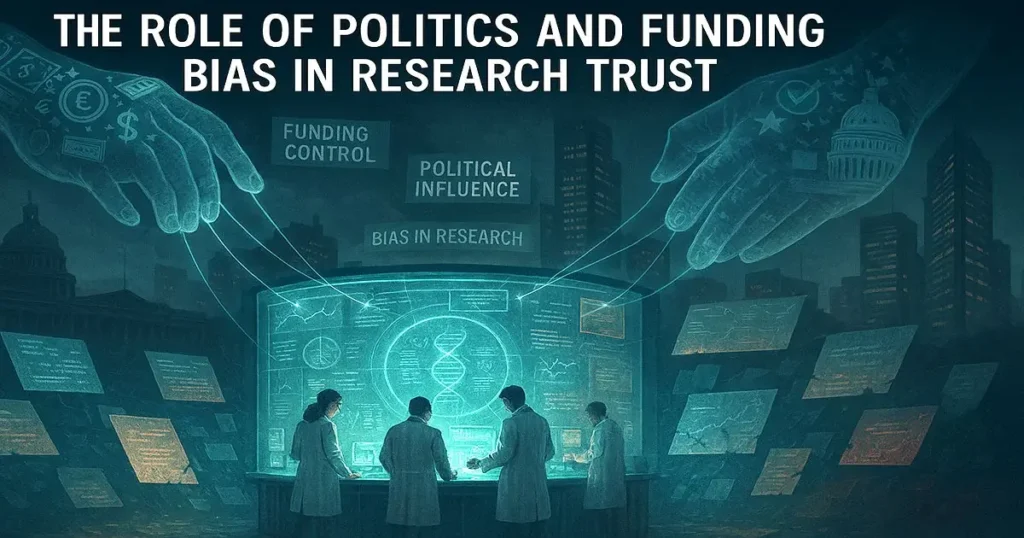
How Politics Shapes Research Agendas
Funding agencies in government tend to focus their research on areas that are in line with political interests and ignore issues that could come up with inconvenient results. This partisanship breeds knowledge gaps and strengthens the prejudices of people, in that scientific investigations may have hidden political motives.
The polarization between the parties has penetrated hitherto neutral scientific fields, with research results being linked to specific political stances instead of being judged by empirical evidence on its own.
Corporate Funding Bias Issues
Sponsorship of an industry implies the presence of conglomerate conflicts of interest that can disrupt the objectivity of the research. Although corporate funding results in valuable research, which could not otherwise have been performed, it also creates incentives to structure research to serve the commercial interests of a specific study rather than the scientific truth.
The drug industry has been especially under attack in financing research studies that highlight the positive attributes of drugs and downplay discussion of risk, but compel many individuals to wonder whether the problem of profitability in medical research has vitiated the integrity of medical research.
Conflicts of Interest in Academic Research
Scholars whose livelihoods depend on the generosity of an outside benefactor may have some minor pressure to produce findings that will be satisfactory to the funder. The study and the way and manner of data interpretation or data publication strategy can be influenced unconsciously by such dynamics.
Even within the university, financial ties exist between universities and corporate and government sponsors that may place institutional pressure on research independence and objectivity.
Mistrust in Medical and Healthcare Research
The field of healthcare is where research skepticism has the gravest of implications, as it has a direct impact on treatment options, which can directly impact the life and survival of patients.
Public Skepticism Towards Medical Trials
Clinical trials are increasingly pinned with general distrust, as much as they are widely regulated in order to safeguard the participants and maintain scientific rigor. There is also a common conception that pharmaceutical firms distort trial results to hide side effects harmful to the people or overestimate the therapeutic effects.
These fears have been boosted by the fact that in the past, there were historical examples of drugs that were approved following faulty trials, but then withdrawn in cases when the safety was compromised, causing a greater suspicion of patients who then became less willing to take part in research or place trust in a new type of treatment.
Impact of False Research Claims in Healthcare
Diseases are propagated through medical misinformation because medical decisions are so personal and pressing to people with health difficulties. False advertising on the effectiveness or safety of treatment may impact thousands of individual decisions, with some resulting in tragic outcomes.
The continued existence of thoroughly disproven theories, especially the vaccine-autism relationship, is an example of how medical misinformation can be ingrained into the consciousness of the general population despite existing overwhelming amounts of evidence disproving the theory.
Vaccines, Pandemics, and Public Perception
COVID-19 made people realize the existing cracks in the trust of people in medical research. The fast-changing scientific knowledge that ought to have been characterized by rigorous, continuous research was understood by many people to indicate that the scientists did not really know about the virus.
The officials in the field of public health were unable to communicate natural uncertainty in the developing research and still lacked believable authority, which had shown strong disconnects between scientific reasoning and citizen demands to have clear answers.
Breakdown of the Peer Review System
Peer review has been used as a quality control in scientific publication, yet it has been documented to fail, and there is growing criticism of the gatekeeping system.
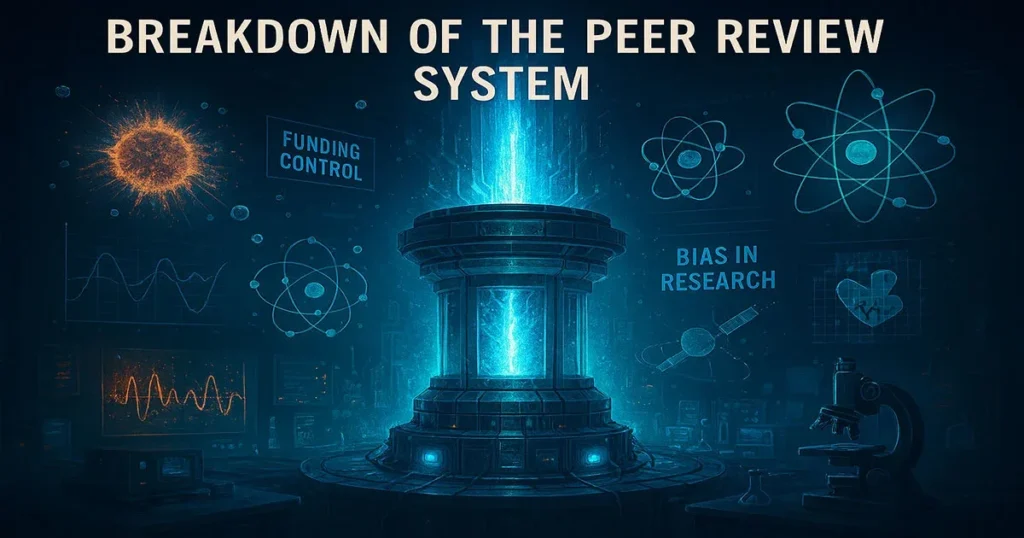
Flaws and Limitations of Peer Review
There are several structural weaknesses in the peer review process. The reviewers usually volunteer their professional knowledge without payment, and sometimes they make fast judgments on complicated research work. Academic networks have a risk of bias relating to personal relationships, and a lack of expert availability in specialized areas may mean insufficient scrutiny.
Although anonymous review systems maintain the independence of the reviewers, they can also facilitate unfair comments or permit undisclosed conflicts of interest to be used unfairly in evaluations without any accountability.
Cases of Corruption in Scientific Studies
Recent investigations have uncovered systematic corruption within peer review processes. Fake reviewer networks, where researchers create fictional identities to approve their own submissions, have compromised multiple journal publications. Some publishers have received payments to post positive reviews or schedule faster publications.
These findings have torn apart the belief systems that peer review is an infallible quality filter, where scientific communities have had to face the fact that their quality control systems need to be redesigned fundamentally.
Calls for Reform in Research Evaluation
These systemic issues have been identified and have led to new methods of research evaluation. Other journals are publishing reviewer comments alongside accepted articles, which makes them more transparent and also accountable to the reviewers. The further critique of the quality of the research would be made possible through post-publication evaluation platforms.
Emerging technologies, such as artificial intelligence, have the possibility of identifying how data has been manipulated, statistical mistakes, and research misconduct that may be missed by human reviewers at the initial point of evaluation.
Public Perception of Scientific Research Today
Modern views on scientific research are a product of the popular attitude towards scientific research of a population that has learned to doubt sweeping statements and conflicting results, and this fosters the overall state of skepticism and affects the social impact of research.
Skepticism Towards Research Findings
Today’s information consumers have developed defensive attitudes toward research claims, having learned to suspect studies that seem too promising or contradict established wisdom. While this wariness can protect against misinformation, it also creates resistance toward legitimate findings that challenge popular assumptions.
People have observed patterns of contradictory research—coffee alternately praised and condemned, dietary recommendations constantly changing—and interpret this as evidence of scientific unreliability rather than understanding it as natural knowledge refinement processes.
Decline of Trust in Research Studies
Polling statistics are constantly showing a decline in trust of scientific institutions among all population groups. The younger generations, even though their education is more formal and advanced compared to other generations, are especially sceptical about studies that are sponsored by companies or governmental authorities.
The paradox of our present is characterized by the fact that we live in the most highly scientifically advanced civilization in the history of the human species, and there is a noticeable decrease in the levels of trust of the population in scientific institutions and discoveries.
Research Reliability Concerns
Well-publicized unsuccessful attempts to replicate key published studies have cast a basic challenge on the reliability of research. Once independent researchers can not recreate the shining lights of research, it indicates that there are some serious issues in the way research is done, assessed, and published.
These crises of replication have come especially to harm the social sciences and psychology, where human behaviors of a complex nature are unpredictable and uncontrollable with simple preferential treatment.
Real-World Case Studies of Research Mistrust
Examining specific instances where research trust collapsed provides valuable lessons about how these crises develop and spread through society.
Famous Retracted Studies and Their Aftermath
The Wakefield study of autism stands as the biggest research fraud ever in the history of modernity. With such tremendous evidence to the contrary, and containing one fake study, this single fake article has been shaping parental choice all over the world, causing disease outbreaks in lower-vaccination communities.
Food studies sponsored by sugar industry organizations would subsequently be found guilty of understating the dangers of overconsumption of sugar. Such disclosures confirmed the suspicion of people about corporate interest in corrupting scientific discoveries.
Case Study: COVID-19 Misinformation
The pandemic created ideal conditions for research mistrust. Quickly changing scientific knowledge of a new pathogen resulted in the shifting of health guidance that was often taken as an indication of inconsistency or incompetence by society, as opposed to an adequate response to the emerging evidence.
Early research into possible therapies was given enormous publicity before undergoing an acceptable peer review, causing disappointment among people after larger, more intensive studies failed to validate the promising early findings.
Academic Research Mistrust Examples
Scandals of data creation in reputable universities in the recent past have already shown that even in the most respected institutions, research misconduct may take place. Such cases support notions among the general population that the prestige of academia does not necessarily ensure research integrity.
The reputation of peer review systems as effective detection systems of scientific misconduct has been further damaged by the finding of extensive image manipulation in published articles in a variety of fields.
Impact of Growing Mistrust on Science and Society
The loss of research credibility has impacts that are far-reaching, going well beyond scholarly controversies, into policy implementation, medical outcomes, and technology development.
Breakdown of Trust in Research Institutions
Communities that universities and research centers are expected to serve have never raised more doubts than they do today. This undermining of institutional power makes it hard to find financing in the form of a popular budget to fund valuable research and diminishes the role of some expert input to the policy-making process.
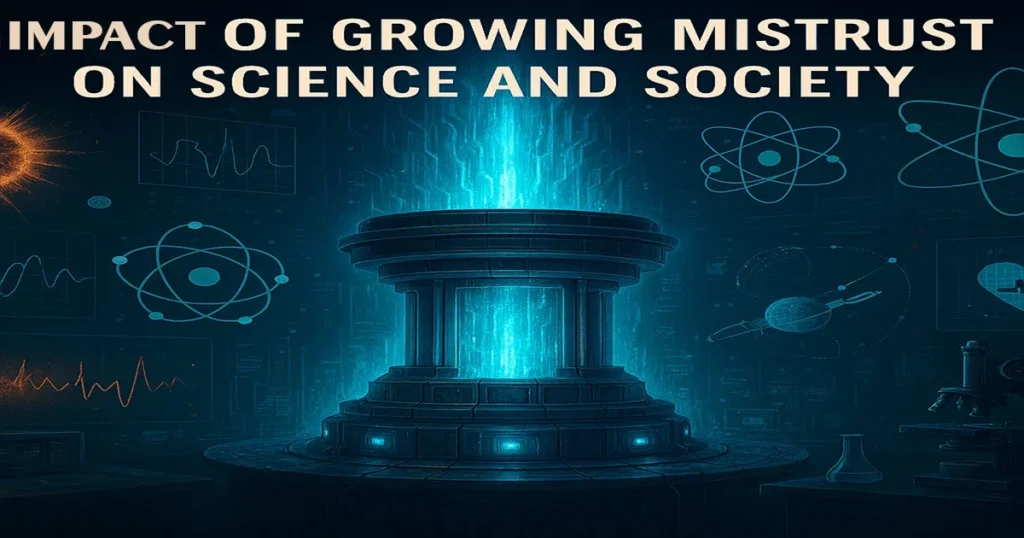
Such a loss of trust is especially relevant to such disciplines as climate science and public health, where research results play a direct role in policies that need the backing of the masses to be enacted.
Policy-Making Challenges
In the world, governments are unable to enact evidence-based policies where large groups of the population do not subscribe to the research. This difficulty is urgent in the cases of health emergencies or environmental crises when quick policy decisions are to be taken based on cooperation with the population.
Political leaders are torn between scientific advice and the doubts of the people, and they more often than not prefer political expediency to evidence-based decision-making strategies.
Effects on Healthcare and Innovation
Mistrust among patients in medical research is associated with delays in treatment, lack of drug adherence, and choosing alternative treatment methods that have not been proven. This behavioral change has adverse health outcomes on individuals as well as the medical costs and burden on the healthcare system.
By worrying about innovation, individuals are sabotaging innovation by reducing research funding and thereby reducing the rate at which new treatments and technologies that may be of benefit to entire societies are being developed.
Research Integrity and Accountability
The restoration of public trust requires basic changes in the conduct and appraisal of research and its dissemination to wider communities.
Importance of Research Ethics
Ethical research practices must become absolute requirements rather than aspirational guidelines. Such a change would entail the adoption of effective oversight mechanisms, application of significant penalties to misbehavers, and the establishment of institutional cultures that would place a premium on integrity rather than productivity rates.
More training on ethical decision-making should be offered to the researchers, especially on handling conflicts and responsible sharing of findings with both the scientific and the general public.
Transparency Measures in Publications
Data sharing, disclosure of methods, and pre-registration of studies are open science practices that can radically enhance the credibility of research. By making their work transparent, researchers can make it easier to verify findings and identify possible problems for others.
Most journals today insist that authors post underlying datasets and describe methodology in detail, enabling members of the scientific community to test and subsequently extend published work.
Ensuring Accountability in Science
The accountability systems should include individual scientists, institutions, journals, and funding agencies. This broad-based strategy keeps the entire stakeholders on high standards but punishes the lack of ethics.
The last efforts of the international scientific authorities have come up with more precise guidelines to be used in case of misconduct and to enhance transparency in research assessment processes.
How to Identify Reliable Research
Training in analyzing the quality of research is now necessary to make effective decisions in a world where there are many contradictory arguments and dubious studies.
Key Indicators of Credibility
Upon the reliable research, several distinguishing characteristics are common to the research: publication in peer-reviewed journals, authorship by competent specialists with corresponding institutional qualifications, replication of the research by other researchers, and reference to the research by other research extending the results.
Be especially skeptical of single studies that make dramatic claims that defy accepted scientific consensus without offering any strong reasons as to why there is a discrepancy.
Checking Funding Sources and Conflicts of Interest
Always inquire about the sponsorship of studies and the financial or professional connection of the authors to their investigations that would affect the decision made. Although the industry funding does not automatically nullify research, it does imply that the possible conflicts must be examined closely.
Request disclosure forms of the source of funding and competing interests. The lack of disclosure should be a question of the credibility as well as the transparency of the studies.
Using Peer-Reviewed Journals Effectively
Peer-reviewed published materials are far apart in terms of standards and reputation. Target journals that have high-quality track records working within their respective areas of interest, with special attention to systematic reviews or meta-analyses that summarize the results of several independent studies.
Do not generalize on the basis of single studies, particularly those that are small, studies that are in their early stages of research, and other studies that have been conducted by independent researchers who have not yet been replicated.
Solutions to Scientific Mistrust
Research skepticism is an issue that involves concerted effort by scientists, institutions, media houses, and educated citizens in coming together to achieve the shared objective.
Restoring Credibility in Science
Scientific circles should be sincere in admitting mistakes that occurred in the past and still show actual changes in their work. This involves the introduction of increased ethical oversight, improvement of transparency measures, and taking institutions to task when it comes to research misconduct.
To fill these gaps between technical discoveries and popular knowledge, scientists need superior training in communication to the general public so that the community can learn to value both the potential and the limitations of scientific research practices.
Promoting Open Access and Data Sharing
The democratization of knowledge through the breaking of the paywalls that restricted access to scientific literature could weaken the suspicions of an agenda being forced or of an insider being exposed. The independent experts will be able to review the results and determine possible concerns more easily when the research is made free.
Open data projects allow other scholars to check conclusions and make further analyses, which enhances the trust of the published results in case there is an independent validation of the findings.
Educating the Public on Critical Thinking
In the long-term solutions, there is a need to enhance the level of scientific literacy and analytical thinking skills across the entire society. Education should focus on helping people understand how scientific knowledge develops gradually and why apparent contradictions often reflect natural knowledge refinement processes.
Teaching methods should be applied to educate the use of source evaluation, recognition of logical fallacies, and research understanding of the differences between correlation and causation in interpretations of research.
Other effective reforms are the adoption of blockchain technology to permanently record research, the diversification of populations in studies to enhance the generalizability of research results, and the enhancement of punishment against research misconduct.
The Future of Research Trust (2025–2030 Trends)
The new technologies and changing professional norms provide the real promise of restoring credibility in research by offering better verification and increased transparency regulations.
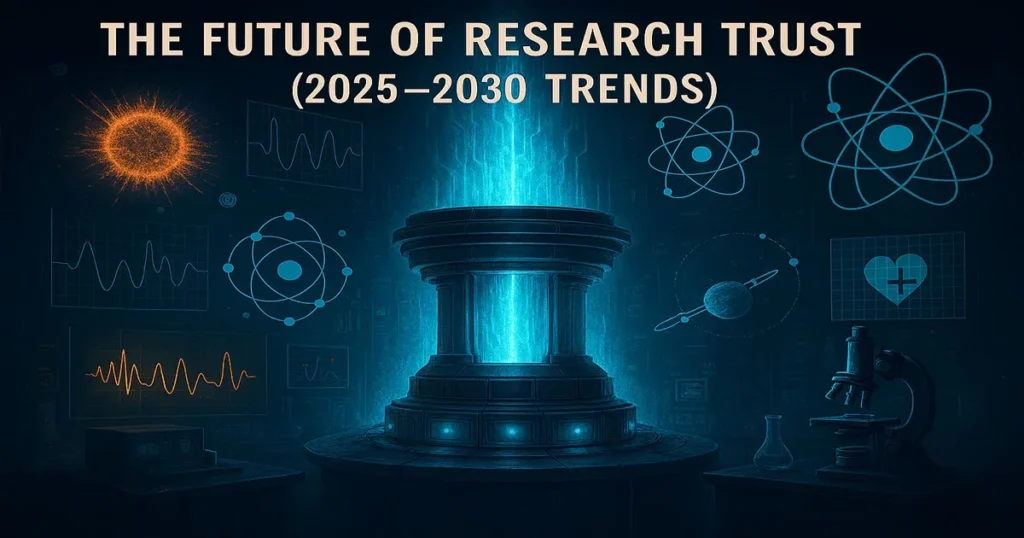
AI in Research Verification
Applications of artificial intelligence are reshaping the way in which we uncover misconduct in research and authenticate scientific findings. State-of-the-art systems are able to detect statistical anomalies, indicate possible data manipulation, and match claims with extant literature faster and more accurately than before.
The algorithms developed to perform machine learning can estimate the likelihood of studies failing in an attempt to be replicated to assist in prioritizing the verification and sometimes more efficiently assigning resources.
Blockchain for Research Transparency
The distributed ledger technology offers interesting solutions on how to build tamper-proof research documentation. When data gets into blockchain systems, it cannot be undone, and thus, permanent documents of research procedures and discoveries are guaranteed.
There are a number of pilot programs studying blockchain implementation in publishing research, peer review, and sharing of data, which may transform methods of upholding and validating scientific integrity.
Global Initiatives to Rebuild Trust
Global partnerships are working on uniform research ethics, transparency, and communicating research to the public. These activities are made to promote the development of uniform international standards that can rebuild confidence in the scientific institutions without paying attention to geographical boundaries.
The efforts to strengthen science communication and fight misinformation, as well as to support evidence-based decision-making in various cultures and political regimes, are being led by organizations such as the World Health Organization.
Conclusion
The state of crisis in research credibility today is a symptom and a great chance to make a difference. Though trust has been destroyed because of the valid fears over ethics, transparency, and accountability, there are ways that we can find solutions.
To restore credibility in research, there is a need to be truthful with the recognition of errors made in the past, systematic reforms, and adherence to increased standards of integrity and transparency. Scientists have to accept their role in the open public communication, and citizens need to gain more skills to critically analyze scientific information.
It does not take blind faith in the power of science to move forward, but a sincere association of both the researchers and the society through mutual respect, transparency, and commitment to the truth. By delivering a consistent and real research ecosystem, through years of hard work and genuine reform, we will be able to gain and keep the trust of the public.
Science is the most powerful instrument of human knowledge of the world and the complexities that can be solved. We can save this priceless asset for future generations by addressing present trust crises head-on and making sure that it is used to benefit the common good of people and not just the selfish interests of a few.
The road to rebuilding trust will not be smooth and fast, but it is necessary to stay afloat in the scientific framework that modern society relies on to advance and thrive.
FAQs
Why is there increasing distrust of scientific research on the part of the population?
- The lack of confidence in whether research is in the best interest of the people or the interests of the researcher is because of the high-profile research scandals, conflicting findings of studies, sensational media reporting of these studies, and the exposure of researcher conflicts of interest.
What can the media do to influence a belief in science?
- The media often drastically simplifies a complicated study or exaggerates a discovery to gain the attention of readers, which leads to unrealistic expectations on the part of the population. When the true picture does not concur with the overstated statements, human beings accuse scientific research as opposed to the bad journalism habits.
What are the largest causes of mistrust of research?
- The main causes are fraudulent research, lack of proper peer review control, conflicts of funding interests, political influence in research agenda, and lack of access to research information and methods by the masses.
What can people do to find sound research?
- Locate peer-reviewed journals and publications by reputable journals, evaluate the qualifications of the authors, where they work, their research agenda, and publication information, and first find research that other researchers have replicated.
So what is being done to regain the trust in research?
- Such reforms have been suggested as: the encouragement of open access publishing, making ethical standards more strict, the use of advanced technologies of verification, the enhancement of the current science communication practices, and the education of people about the critical evaluation of scientific information.

